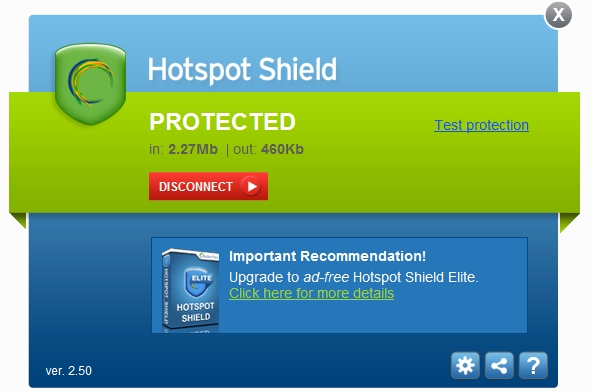

The VPN will protect your connection when you are accessing the internet through a WiFi hotspot, and a software security feature detects malware and phishing sites. Many educational institutions and companies block access to a range of websites, but accessing them via a VPN gets you through the block. You may need a VPN to skirt around proxy restrictions on the network that you use to access the internet. This means that HotSpot Shield is no good if you are from another country and want to use a VPN to access home media sites when you are abroad – the geo-location restrictions on these websites require access from the same country. You get security, but you are only allowed access to one of the company’s server locations – the USA.

HotSpot Shield is sufficiently secure to dodge the restrictions of a number of despotic regimes – it was widely used by protestors during the Arab Spring freedom movements in Libya and Egypt in 20. This may be the cause of the service’s rapid uptake among the public. Until 2016, the VPN offered unlimited bandwidth. This figure allows the company to claim to be the most widely-used VPN service in the world. It has been installed by more than 500 million users. HotSpot Shield is produced by AnchorFree. What Features Does Free Hotspot Shield Have? When you connect with the VPN server, your browser will open with the corporate website – that’s as far as the advertising intrusion goes. However, the advertisements do not appear in the interface, and you are not plagued by Trojan-style pop ups. This is the price you pay for getting something for nothing. If the free version had as many features as the premium offer, then no one would be interested in paying, and the company would never make any money. As such, the limits on data throughput and the number of simultaneous connections seem perfectly reasonable. The purpose is to lure customers into the elite product. This cut-down version of a paid service has limitations that make it easy to see why it exists. The secret service or copyright holders could also put out a fake VPN in order to trap unwitting users.Ī totally free service is suspicious unless it seems to have some commercial value. After all, a totally free service could be a con, put out there by criminals who want to trap people into revealing their personal data, while thinking that they are protected by internet security measures.

Why would a company go to the trouble of creating a useful tool, and then not charge for it? This free VPN might make you suspicious. Bottom LineThis attractive and free service should be treated as an introduction to VPNs.


 0 kommentar(er)
0 kommentar(er)
